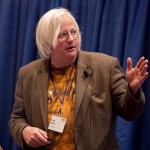 Advanced high school students are getting exposed to RSA (the first public key cyrypto system) along with their math track. In such schools as the exclusive Phillips Academy, I’m sure they are having informed debates in their classrooms, regarding the Apple vs. FBI standoff.
Advanced high school students are getting exposed to RSA (the first public key cyrypto system) along with their math track. In such schools as the exclusive Phillips Academy, I’m sure they are having informed debates in their classrooms, regarding the Apple vs. FBI standoff.
I think this is important because everyone who wants privacy and to make sure that their financial, medical information, and all information is kept private should be interested in the Apple vs. FBI standoff that ended in a whimper. All of us will be eventually become cyber experts.
They’re certainly better equipped, concept-wise, than less privileged kids who might not even get any SQL, even in all four years of high school (!).THE ENIGMA
But, there a rub. An aspect of that story I see differently reported is:
(A) when the passcode is miss-entered more than 10 times, the phone wipes away its data (99% of the stories put it this way)
(B) the phone doesn’t have to wipe out anything except the decryption key, leaving the phone encrypted forever (1% put it this other way).
One might argue the difference between “erased” and “indecipherable” is negligible, but I think it’s an important distinction to make.
The “erased” mental model leaves people with an over-simplified understanding of why the FBI couldn’t get to the data in that case: it’s gone.
The “forever encrypted” mental model reminds the public of something else: the data is still there, just the code in uncrackable. That means ordinary people have access to uncrackable codes? Sure thing, but not everyone understands that, even in 2016.
Those who understand RSA will have a better appreciation for how this might be mathematically possible. One needs a pair of numbers to unlock the scrambled data (N, d). Lose the d, and all is lost, unless N were too small in in the first place. RSA may fall in the future, when quantum computing is more a reality but as of today it’s still “military grade” (uber-secure) and embedded in every web browser.
DOES THE GOVERNMENT NEED ACCESS TO ALL OF MY LIFE?
My own view on the matter is a state should not be precluded in principle from running businesses, applying its own decals and ideals, and that Uncle Sam smartphones or whatever could be handed out, perhaps free of charge, to underprivileged, say through public schools.
We all should cell phones, if only for safety reasons. We use them to report suspicious, potentially terrifying activities. If you’re family can’t afford one, Uncle Sam will step in, even offering classes in how to use it.
The USG branded models be FBI hackable of course (a feature not a bug) and will come with many other benefits only the US is in a position to deliver: a wide range of special apps, foregrounding the many benefits of US citizenship. You’ll be able to vote, pay taxes, and check your social security benefits, all from your Uncle Sam smartphone.
My suggestion does not solve the specific problem of the San Bernadino iPhone, however I do think patriots who want to make a statement of support, should be able to go to Walmart or other outlet and buy whatever ideologically correct phone suits their persona.
The USG might even mandate its smartphones be used at work, by Federal employees. The FBI will get to “eat its own dogfood” (practice what it preaches).
Sure, would-be criminals will prefer privacy over affordability and convenience, but then ordinary citizens have access to the same cryptographic techniques they do, no license or background check required.
That cat is well out of the bag.
RSA is no longer under any patent restrictions.
Freely downloaded apps make it easy to encrypt practically any data or communication. We crossed that bridge a long time ago, in the days of Pretty Good Privacy (PGP) and so on.
Extrapolating further: I’d like to see Uncle Sam with its own chain of hotels, a rental car company, an airline… These businesses will need to be open source / open book so people learn from their transparency. They’re still have to turn a profit, to pay their own way. They’re a source of revenue for the country.
 We’ve taken privatization a long way; let’s try going the other way for a change. In the Kingdom of Bhutan, the army helps pay bills by distilling alcoholic beverages, sold in the commercial market.
We’ve taken privatization a long way; let’s try going the other way for a change. In the Kingdom of Bhutan, the army helps pay bills by distilling alcoholic beverages, sold in the commercial market.
I’m not talking about the government nationalizing the oil companies or the banks. The USG already runs hospitals (the VA) and a postal service, prisons, a lot of schools. Why not a competitive phone service as well, accessible to ordinary consumers, not just Federal employees?
These businesses could serve as role models, showing other capitalists how it’s done. Those who always criticize the government for not understanding about business, will have less of an argument.
Bio:
Kirby entered the world stage near the campus of the University of Chicago, where his dad was getting a PhD in Urban Planning, and soon moved to Portland, Oregon, a city known for its city planners. However Jack wished a blanker canvas, a developing country or region to work with, and the family soon moved to Rome, Italy from where Jack could plan for Libya. The family continued globe hopping, to the Philippines, Egypt, Bangladesh, Bhutan, Lesotho and South Africa (where Jack died). Kirby obtained his BA from Princeton, under the tutelage of Richard Rorty and peers, and focusing on the philosophy of Ludwig Wittgenstein (thesis topic). He was always interested in computers ]devoted many hours to their study. Programming, along with teaching, have been the pillars of his technical career. He partnered with his wife to be in 1990 to form a consulting business, Dawn Wicca and Associates (DBA 4D Solutions) which thrived until she died of invasive breast cancer (IBC) in 2007. Kirby has two daughters. His mother Carol, is a world famous peace activist and his sister Julie lives in Whittier, Greater LA. Kirby currently teaches computer programming for a variety of outfits (his resume is at Grunch.net).